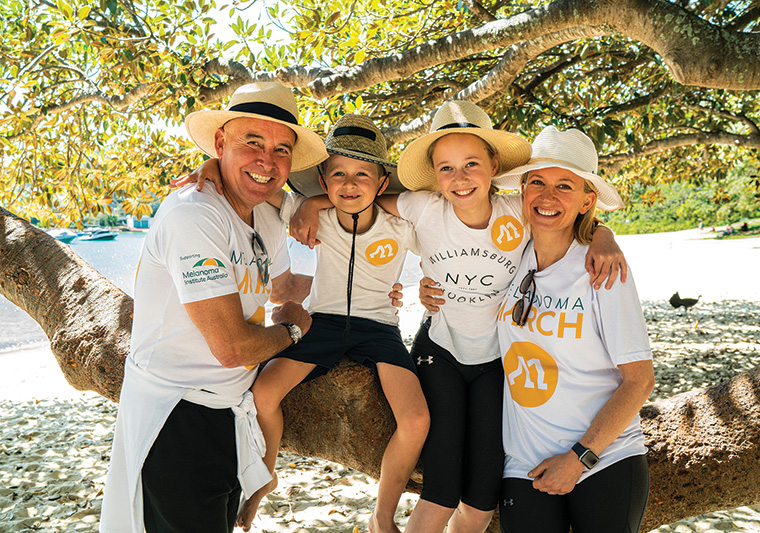‘The first thing that went through my mind was that they had got it wrong. That can’t be right, that’s not me. I’m half Greek! I have olive skin and it doesn’t happen to me, this happens to fair-skinned people.’
Jen Benfield was living in New York in 2013 with her husband Mark, daughter Chloe, then five, and son Charlie, then two, when she had a mole removed from her back.
The next phone call from her doctor was not the one she was expecting.
‘They said ‘I want you to come in and I want you to come in now’. They told me I had an aggressive melanoma and I needed to go straight into surgery. I walked out of there in shock.
‘It all happened so fast, my head was spinning. Within a week I had the wider excision and they checked my lymph nodes and then I was all clear. They told me I would have to see a surgeon or an oncologist every three months for the rest of my life.’
At the same time, Mark’s mum was having problems with her back. She had suffered from arthritis and joint issues for a long time, so didn’t think much of it. After an unrelated procedure, doctors found that she had metastatic melanoma in her spine. Years earlier, she’d had a primary melanoma removed from her arm. Melanoma claimed her life within three months of her diagnosis.
The Benfield family moved back to Sydney where Jen was monitored by Melanoma Institute Australia surgeon Associate Professor Robyn Saw for four years.
‘She looked over me with a fine-toothed comb regularly, and for four years I remained clear.’
However, during a routine scan they found a spot on Jen’s lung. A repeat scan showed the spot had grown and another had appeared next to it. A PET scan found more spots on her kidney and for a year she underwent three-monthly scans, waiting on the spots to grow enough to determine what they were.
‘It was a year of pure fear and dread at every scan, wondering what it was, knowing what it could be.’
Finally, they were able to biopsy a spot on her lung and it was confirmed that Jen had Stage IV melanoma.
‘I was still in denial, thinking no, no, it can’t be that, it cannot be that. This does not happen to me. But it does. And it did.
‘If you Google Stage IV cancer, it’s really scary. There’s fear. Not so much of dying, but of missing out on all those great milestones of the kids, and of them not having their mother around. I want them to have support from me throughout their life. I don’t want them to be growing up without their mum.’
Jen was referred to MIA Co-Medical Director, Professor Georgina Long who took her case to MIA’s multidisciplinary team meeting where clinicians to pool their expertise to make the most informed decisions about some of the more complex cases.
‘It is pretty incredible to know that this happens behind the scenes, to know that there isn’t just one set of eyes looking over what might be the best way forward for you and that there are so many people involved in the direction of your treatment.’
Jen was put on an immunotherapy clinical followed by surgery to remove the tumours. She is now cancer free, with no evidence of disease.
‘If I had been diagnosed 10 years prior, I wouldn’t be here to tell my story because they would never have operated on me as Stage IV at that time.
‘I’m lucky that it happened when it did. I’m lucky I had access to Melanoma Institute Australia and Professor Georgina Long, Associate Professor Robyn Saw and the whole team, and that there were options.
‘That’s the biggest thing, Professor Long Georgina always provided me with options. She said ‘we’re going to do this, and if this doesn’t work, we’re going to do this’. It gave me some relief that there were options.
‘I know there are so many people out there who are still struggling and I just hope that my story inspires people to put one foot in front of the other when
they’ve had that terrifying diagnosis.’
Jen and her family participate in the Manly Melanoma March as ‘Wiser and Well’ and she urged her friends and relatives to join them.
‘Melanoma March is what I tell my friends and family to do when they ask how they can help. As a nation, we should all be behind Melanoma March as melanoma is Australia’s national cancer. It is the most important thing we can do to help raise awareness and support the work done at MIA.
‘The support means everything to the people who are going through it, to those who have lost someone, to their families and friends.’
‘I felt hopeful that I was going to beat it, and I still remain hopeful that I’m going to beat it.
‘Maybe in five years, when we’re still having this conversation, I’ll feel relief that I’ve broken that barrier of five years.’



